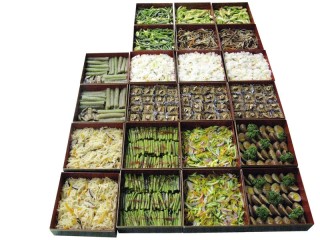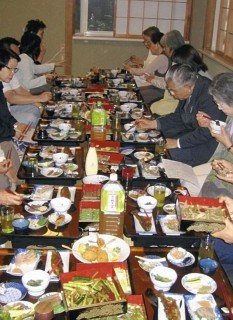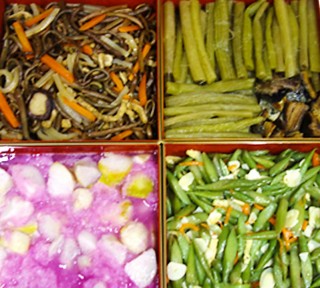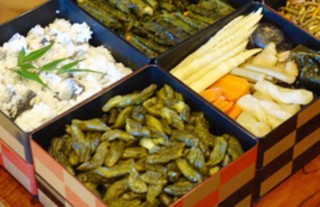Loading
Search
▼ Traditional Iwate Cuisine Lures Tourists
- Category:Gourmet
MORIOKA — A traditional dish in Shizukuishi, Iwate Prefecture, which has been eaten by local residents, is now drawing fresh attention as a tourism resource.
Known as “jukko,” the dish is being promoted by the tourism industry, with the town office highlighting its appeal at tourism business meetings outside the prefecture. Major travel agencies have also shown interest, inspiring confidence in the people involved in jukko’s promotion.
Jukko has played an indispensable part in the town’s ceremonial occasions and farming community events, such as rice planting and harvesting. Each family prepares simmered and marinated foods, Japanese pickles and other ingredients, then arranges them in multi-tiered food boxes that they bring to gatherings.
Participants pass around and share the contents of the boxes brought by the different families. Songs are played on festive occasions, including the prefecture’s local Nanbu Yoshare folk songs, reflecting the jukko’s integral role in the lives of the town’s residents.
Hitoshi Nakagawa, 76, chairman of the council for the promotion of green tourism in Shizukuishi, suggested highlighting the traditional dish as part of promoting the town’s touristic charms. Nakagawa has run a minshuku inn in the town for nearly 40 years.
He focused on the dish for its characteristics specifically evocative of the region. The town’s tourism industry was in a slump at the time, caused partly by a decline in the number of visiting skiers.
“When I was a child, jukko was the key festive dish. I wanted to recreate the joyous scenes of old, in which many people enjoyed it with doburoku sake,” Nakagawa said. He started offering jukko, and producing and selling doburoku sake, at his minshuku inn about 10 years ago.
His wife Fumiko, 74, makes the jukko, which features many traditional local ingredients such as vinegared bracken plants and simmered herring, as well as bamboo shoots and the mizu wild vegetable in mustard dressing.
“Elderly guests from urban areas like it because it reminds them of their own hometowns,” Fumiko said. If requested, they play different songs, including yoshare folk songs. These services have also proved popular among foreign tourists.
Hitoshi Nakagawa, 76, chairman of the council for the promotion of green tourism in Shizukuishi, suggested highlighting the traditional dish as part of promoting the town’s touristic charms. Nakagawa has run a minshuku inn in the town for nearly 40 years.
He focused on the dish for its characteristics specifically evocative of the region. The town’s tourism industry was in a slump at the time, caused partly by a decline in the number of visiting skiers.
“When I was a child, jukko was the key festive dish. I wanted to recreate the joyous scenes of old, in which many people enjoyed it with doburoku sake,” Nakagawa said. He started offering jukko, and producing and selling doburoku sake, at his minshuku inn about 10 years ago.
His wife Fumiko, 74, makes the jukko, which features many traditional local ingredients such as vinegared bracken plants and simmered herring, as well as bamboo shoots and the mizu wild vegetable in mustard dressing.
“Elderly guests from urban areas like it because it reminds them of their own hometowns,” Fumiko said. If requested, they play different songs, including yoshare folk songs. These services have also proved popular among foreign tourists.
Nakagawa and others have promoted jukko at tasting events and other occasions, and it is now enjoying wider recognition in Shizukuishi as a tourism resource. For example, the dish is currently being offered at a hotel in the town, and an event was also held to teach participants how to make it.
Amid rising recognition of jukko, the town also began promoting it in 2014 at business meetings in Tokyo attended by travel agencies and other relevant parties.
“At a recent business meeting, a major travel agency expressed keen interest in the dish, which is giving us an increasing sense of confidence in our efforts,” an official of the Tourism, Commerce and Industry Section of the town office said.
Amid rising recognition of jukko, the town also began promoting it in 2014 at business meetings in Tokyo attended by travel agencies and other relevant parties.
“At a recent business meeting, a major travel agency expressed keen interest in the dish, which is giving us an increasing sense of confidence in our efforts,” an official of the Tourism, Commerce and Industry Section of the town office said.
As jukko consists of many ingredients, requiring care and time for its preparation, including the several days required to desalt salted wild vegetables, Nakagawa’s inn requires customers to make reservations in advance and only serves it to groups of 10 guests or more.
“We’re developing a ‘jukko bento lunch box’ to enable visitors to enjoy the dish more easily. We hope to commercialize this soon,” Nakagawa said.
“We’re developing a ‘jukko bento lunch box’ to enable visitors to enjoy the dish more easily. We hope to commercialize this soon,” Nakagawa said.
- March 1, 2017
- Comment (0)
- Trackback(0)





